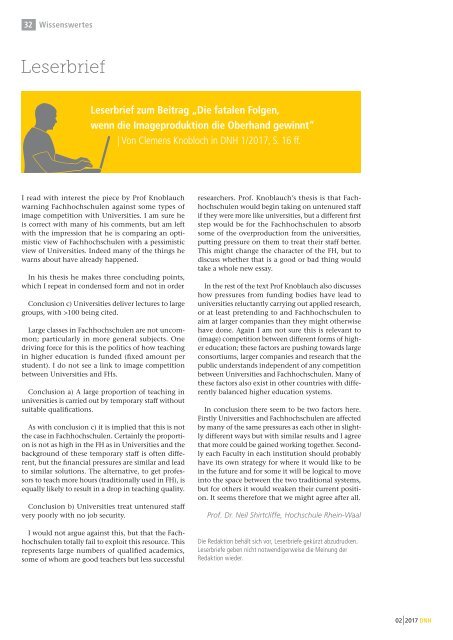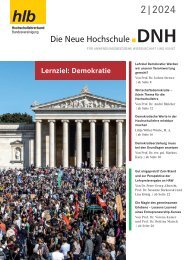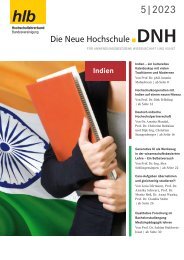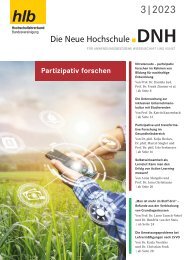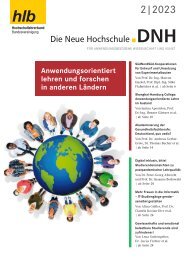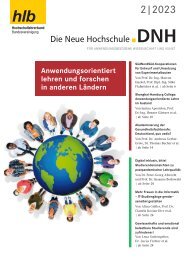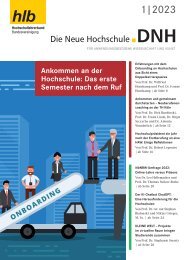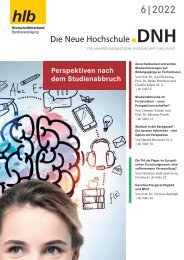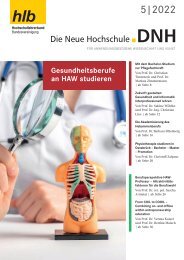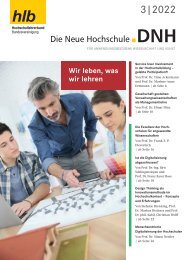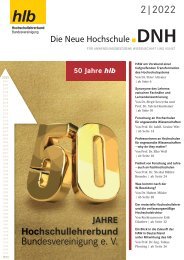Die Neue Hochschule Heft 2/2017
Zeitschrift des hlb Hochschullehrerbund e.V. - Themenschwerpunkt: Flucht - Migration - Studium
Zeitschrift des hlb Hochschullehrerbund e.V. - Themenschwerpunkt: Flucht - Migration - Studium
Sie wollen auch ein ePaper? Erhöhen Sie die Reichweite Ihrer Titel.
YUMPU macht aus Druck-PDFs automatisch weboptimierte ePaper, die Google liebt.
32<br />
Wissenswertes<br />
Leserbrief<br />
Leserbrief zum Beitrag „<strong>Die</strong> fatalen Folgen,<br />
wenn die Imageproduktion die Oberhand gewinnt“<br />
| Von Clemens Knobloch in DNH 1/<strong>2017</strong>, S. 16 ff.<br />
I read with interest the piece by Prof Knoblauch<br />
warning Fachhochschulen against some types of<br />
image competition with Universities. I am sure he<br />
is correct with many of his comments, but am left<br />
with the impression that he is comparing an optimistic<br />
view of Fachhochschulen with a pessimistic<br />
view of Universities. Indeed many of the things he<br />
warns about have already happened.<br />
In his thesis he makes three concluding points,<br />
which I repeat in condensed form and not in order<br />
Conclusion c) Universities deliver lectures to large<br />
groups, with >100 being cited.<br />
Large classes in Fachhochschulen are not uncommon;<br />
particularly in more general subjects. One<br />
driving force for this is the politics of how teaching<br />
in higher education is funded (fixed amount per<br />
student). I do not see a link to image competition<br />
between Universities and FHs.<br />
Conclusion a) A large proportion of teaching in<br />
universities is carried out by temporary staff without<br />
suitable qualifications.<br />
As with conclusion c) it is implied that this is not<br />
the case in Fachhochschulen. Certainly the proportion<br />
is not as high in the FH as in Universities and the<br />
background of these temporary staff is often different,<br />
but the financial pressures are similar and lead<br />
to similar solutions. The alternative, to get professors<br />
to teach more hours (traditionally used in FH), is<br />
equally likely to result in a drop in teaching quality.<br />
Conclusion b) Universities treat untenured staff<br />
very poorly with no job security.<br />
I would not argue against this, but that the Fachhochschulen<br />
totally fail to exploit this resource. This<br />
represents large numbers of qualified academics,<br />
some of whom are good teachers but less successful<br />
researchers. Prof. Knoblauch’s thesis is that Fachhochschulen<br />
would begin taking on untenured staff<br />
if they were more like universities, but a different first<br />
step would be for the Fachhochschulen to absorb<br />
some of the overproduction from the universities,<br />
putting pressure on them to treat their staff better.<br />
This might change the character of the FH, but to<br />
discuss whether that is a good or bad thing would<br />
take a whole new essay.<br />
In the rest of the text Prof Knoblauch also discusses<br />
how pressures from funding bodies have lead to<br />
universities reluctantly carrying out applied research,<br />
or at least pretending to and Fachhochschulen to<br />
aim at larger companies than they might otherwise<br />
have done. Again I am not sure this is relevant to<br />
(image) competition between different forms of higher<br />
education; these factors are pushing towards large<br />
consortiums, larger companies and research that the<br />
public understands independent of any competition<br />
between Universities and Fachhochschulen. Many of<br />
these factors also exist in other countries with differently<br />
balanced higher education systems.<br />
In conclusion there seem to be two factors here.<br />
Firstly Universities and Fachhochschulen are affected<br />
by many of the same pressures as each other in slightly<br />
different ways but with similar results and I agree<br />
that more could be gained working together. Secondly<br />
each Faculty in each institution should probably<br />
have its own strategy for where it would like to be<br />
in the future and for some it will be logical to move<br />
into the space between the two traditional systems,<br />
but for others it would weaken their current position.<br />
It seems therefore that we might agree after all.<br />
Prof. Dr. Neil Shirtcliffe, <strong>Hochschule</strong> Rhein-Waal<br />
<strong>Die</strong> Redaktion behält sich vor, Leserbriefe gekürzt abzudrucken.<br />
Leserbriefe geben nicht notwendigerweise die Meinung der<br />
Redaktion wieder.<br />
02 | <strong>2017</strong> DNH


